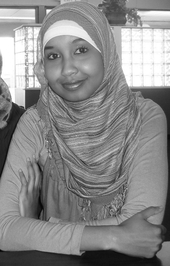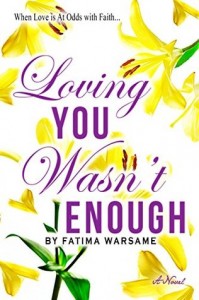Warning for Spoilers!
Loving You Wasn’t Enough is a book about an unexpected love between two Muslim girls. I stumbled upon it randomly on Amazon and was immediately excited by the premise. It a book that claims to explore homosexuality from a Muslim perspective, and it tells a story that is not talked about often. With the exception of Diriye Osman, the Somali-British short story writer and essayist whose stories are usually centered around LGBT Somali characters, I was yet to come across stories that capture the lives of queer Muslim Africans. I was also excited because the author is a Somali woman herself, Fatima Warsame. After going through Warsame’s tumblr page and reading excerpts of the book, I decided to purchase the Kindle version. I started Loving You Wasn’t Enough with high expectations. Two days and several notes and highlights later, I knew I had to write something about it.
Loving You Wasn’t Enough starts with Ebyan seeing the face of her first love on a magazine cover. This completely disrupts her day as the forbidden love she thought she had buried and all feelings associated come rising to the surface. The fear that her family will discover that her first love is screening a fictionalised documentary on their relationship, and the unresolved intense feelings are a prelude to the chapters that delve into Ebyan and Noreen’s tumultuous relationship forged while both were at university. Ebyan first encounters Noreen through the gossip of her fellow sisters at the Muslim Students Association (MSA). The attraction is instant even though Ebyan is clueless, and it grows as the young women get to know each other. The women are quite different, Ebyan is of Somali descent, wears hijab, is an active member of the MSA and prays regularly while Noreen is of Indian descent, appears to be from a very wealthy family that does not adhere strictly to the norms of Islam and does not wear hijab. The dilemma sets in when Ebyan starts falling in love with Noreen, as someone who is portrayed as always having been cautious and careful, loving another woman is unexpected and something that Ebyan struggles to deal with till the last page.

Fatima Warsame Source
This struggle can be a bit contradictory at times, on the one hand Ebyan strongly believes in destiny and that “what is meant to happen to you is one thousand years older than you”, on the other hand she is not willing to take risks and is most times unwilling to examine her feelings for Noreen. It is clear from the get-go that Ebyan is uncomfortable with an homosexual identity. While Ebyan is portrayed as someone who has never fallen in love with another woman, it is slowly revealed that Noreen has for a long time felt attraction towards other women. When a close friend from the MSA reveals to Ebyan that Noreen is apparently gay, Ebyan refuses to believe this and thinks her friend must be mistaken. She is scared of standing up for Noreen out of the fear of being labeled gay herself. Ebyan constantly battles with this love, feeling that prayer will cleanse her of her feelings for Noreen. Yet she goes on to admit that she is love with Noreen, “the kind of love that was described by tormented poets”. It goes back and forth, one minute Ebyan is pushing to be with Noreen and the next she wants to ignore her feelings for Noreen. It is a tug of war between Ebyan’s love for Noreen, her love for Islam, and her love for her family and culture.
When Ebyan finds testimonies of Muslim lesbians online during cursory research, she labels it a contradiction. For her as a Muslim, acting on her feelings is out of the question however she remains steadfast in believing that her feelings for Noreen are not dirty or evil. See what I said about back and forth? This can be frustrating for the reader but you really get to feel the tension. I could not help feeling sorry for Noreen, as a young girl who grew up knowing she was gay but also knowing that her family and religion would never approve. We are only given a glimpse of Noreen’s pain as the story is told through Ebyan’s perspective.
The testy relationship starts crumbling after Noreen comes out to her parents at a party, much to Ebyan’s disdain. Ebyan believes that Noreen should be content with keeping “this part of her life” private. The fighting and tension between Noreen and Ebyan escalates, and Ebyan finally gives up when she sees Noreen making out with another girl. Noreen ends up moving towns leaving Ebyan to deal with being shunned by the Muslim community she had always been part of, as well as with harassment from an increasingly violent mysterious attacker. I found the manner in which Ebyan dealt with the situation brave, it was only in the aftermath that she found the courage to openly state that she loved a woman. Fast forward ten years later, Ebyan encounters Noreen again. The book ends on the positive note as both women meet, sorting through the storm of their past and presumably being friends forever.
Loving You Wasn’t Enough is pretty straightforward about the attraction between the two women. I felt that Warsame was pretty direct in writing about this romance. The sexual tension is shown in Ebyan’s response to Noreen’s touch, we are also shown her shame at this sexual desire. Despite her physical attraction to Noreen, Ebyan remains firm in her belief that any sexual contact would be “repugnant, unnatural” and “forbidden religiously”. At the same time, she finds desirable everything she feels with Noreen including the physical intimacy. This division between sexual intimacy and love seems to have been purposefully done by the author, for example in this article Warsame talks about love beyond the physical. She says loving with the soul is most important and mentions Noreen and Ebyan “making love with eye contact without even going there”. I can agree that there is too much focus on sex these days, yet I doubt that the same would be said of a love story between members of the opposite sex. Even in the few spaces that show Ebyan and her husband, a sex scene manages to be squeezed in there. All Ebyan and Noreen share is a kiss, however there is a scene where Ebyan masturbates while thinking of Noreen.
There is a significant encounter with a freshman Yasmeen, who opens up to Ebyan about feeling same-sex attraction from a young age. While Ebyan clearly states that there is “nothing wrong in having feelings for the same gender” because Islam is not against love and love is natural and from God, the overall message in the book seems to be that same-sex love is all right as long as it never “acted upon”. The implication in Loving You Wasn’t Enough is that it is a sin to act on this love. Ebyan always wanted marriage and prayed to God to fall in love with a man and not with another woman. She admits that she could not give Noreen what she wanted, all she wanted from Noreen was an intimate friendship that would have all the trappings of a love affair save physical intercourse. I found it disturbing that in the end of Yasmeen’s brief appearance, she is engaged to marry a man who knows about and accepts her same sex attractions. Similarly Ebyan goes on to fall in love with her high school sweetheart, who she later marries. I wonder if it is this easy to go from loving a woman to just, not.
While I agree that Loving You Wasn’t Enough does push boundaries in talking about an issue that is usually ignored (Warsame speaks about hoping to ignite a discussion in this short interview), I feel it maintains and reinforces other boundaries. In some ways, it treats homosexuality as a condition that should be dealt with, a Muslim woman falling in love with another Muslim woman is portrayed as a moral conundrum. I imagine that queer Muslim women who read this book may indeed find representation but may still feel as if they are living in sin especially if they have acted upon their same-sex desires. In Loving You Wasn’t Enough we have three Muslim women who admit that they have feelings for other women, of these three, two get married to men. The two, Ebyan and Yasmeen are the strictly devout, hijab-wearing, active in the MSA sisters. The one, Noreen, does not strictly adhere to the tenets of Islam and finds love with a (presumably) non-Muslim woman. I wonder where the devout Muslim women who choose to live their love, including sexual aspects of it, fit into this. I am still looking for their stories.


1 Comment
Beautiful, sad story. Even though I am a male and a cradle Catholic, I lived a very similar story.